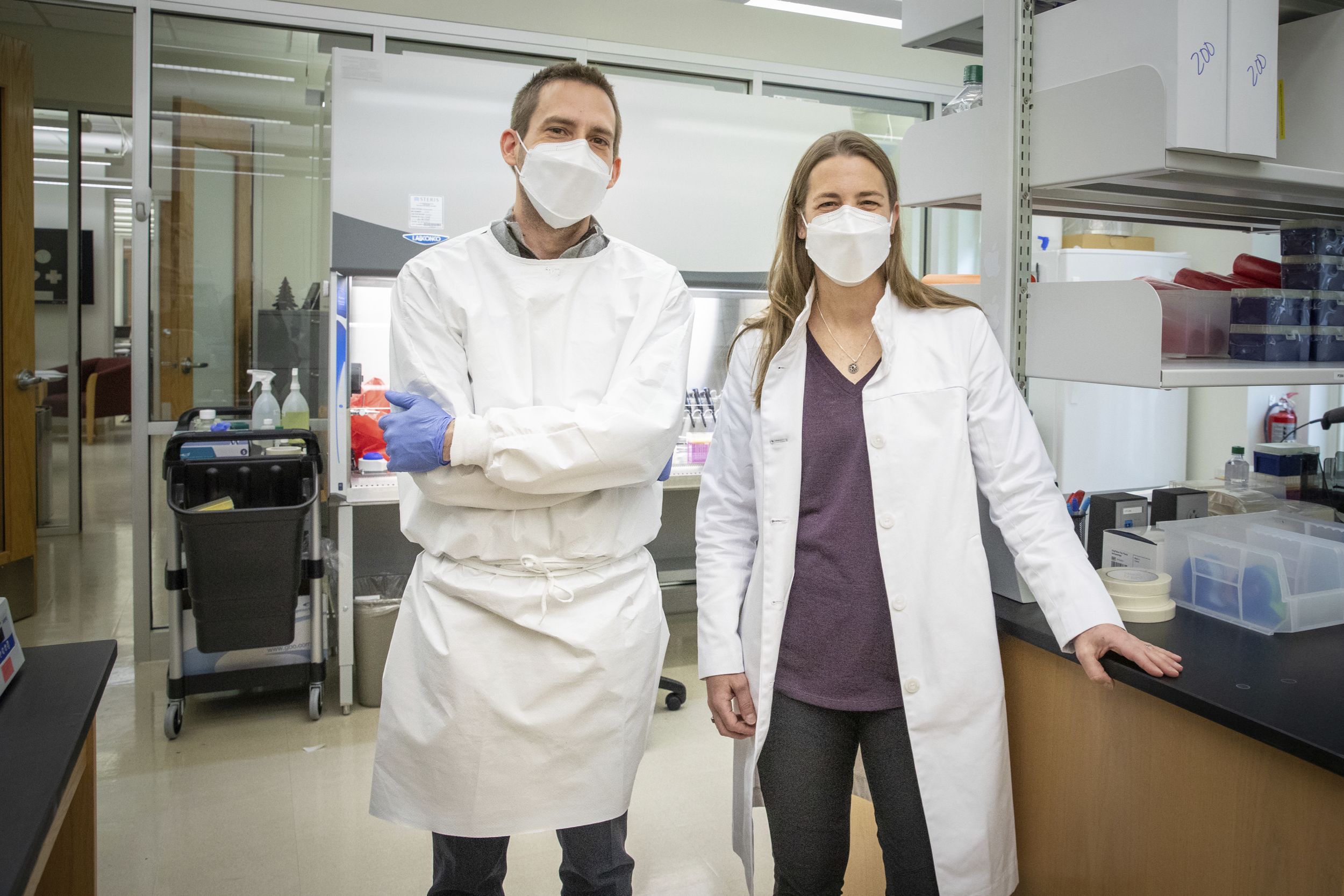Inside the Sewanee Molecular Diagnostics Laboratory
Six things to know about a unique new campus resource whose usefulness will outlive the pandemic.

When students returned from winter break to start the Easter semester in Sewanee, their first stop on campus was the COVID-19 testing site on the fieldhouse basketball courts of the Fowler Sport and Fitness Center. But unlike last semester, when students’ saliva samples had to be couriered to Chattanooga to be tested, this semester’s new nasal swab samples traveled less than half a mile to a facility in Sewanee’s Spencer Hall, where they were tested, and the results of those tests were reported back to anxious students in a matter of hours. The University established the new Sewanee Molecular Diagnostics Laboratory (SMDL) over the past few months to offer on-site COVID-19 testing in order to save time and money, but also to offer an invaluable new resource to students, faculty, and the community that will far outlive the current pandemic. Here are six things to know about the new lab:

1. It’s Run by Sewanee Scientists
Biology professors Clint Smith and Alyssa Summers spent the Advent 2020 semester driving back and forth to Chattanooga to deliver Sewanee samples to the Baylor Esoteric and Molecular Laboratory, where they were also instrumental in the lab’s operations. Over recent months, they’ve acquired equipment, completed the complex state and federal certification requirements to open an esoteric molecular laboratory, and prepared the Sewanee lab for COVID-19 testing. Now, the two scientists are running every test that the lab takes in, and, during routine surveillance testing, returning results to students and University employees the next day. “The personal sacrifices Clint and Alyssa made to help us through last semester—working six to seven days a week for 14 weeks—was not very visible, but it’s the only reason we got through the semester,” says Vice President for Economic Development and Community Relations David Shipps, C’88. “Applying that skill, knowledge, and desire to starting our own lab here on campus was entirely theirs, and we further benefit as a result.”
2. It Uses the Gold-Standard Test for COVID-19 Detection
The Sewanee lab is outfitted with two state-of-the-art PCR machines that can test up to 94 samples in an hour and 10 minutes. Molecular PCR testing—not to be confused with “rapid PCR”—can detect very low viral loads and is the gold standard against which all other tests are measured. The PCR test not only detects the viral genome, but can indicate how much of it is present in a given sample. By analyzing these results, Summers and Smith gain insight into how far along a patient might be in their infection, which can be crucial to informing mitigation and isolation procedures.
3. It Can Indicate Whether the UK Variant is Present
As the SARS-CoV-2 virus has mutated, causing variant strains to arise around the world, it’s important to discern which forms of the virus are appearing in a given population. The Sewanee lab’s PCR machines look for three different genes of the virus, and when it finds two of those genes but not a third, it’s an indication that what Summers and Smith are looking at is likely the UK variant. The biologists recently ordered a DNA sequencer for the lab, which will allow them to identify exactly which variants of the virus are present.
4. It’s a Cost-Effective Solution
In addition to the savings realized by not paying a third party to run its COVID-19 testing, the University benefits financially from the new lab in a number of other ways. Because the positivity rate for Sewanee COVID-19 tests has been extremely low, the Sewanee lab is able to pool samples for ongoing surveillance testing, reducing the number of tests that have to be run. Up to four samples can be combined in a single well before going into a PCR machine. (If the pool test comes back positive, a new test is run for each sample to find the positive individual samples.) To further offset costs, the lab is currently contracted to conduct COVID-19 testing for a number of other educational institutions, while partnerships with other outside organizations for clinical services are likely to follow after the end of the pandemic.
5. It Will Benefit Students in the Sciences
While Sewanee students can’t be credentialed to perform clinical diagnostics, they will benefit from having the lab on campus. They’ll be able to explore research questions whose answers depend on clinical data that comes straight from the lab. “Having a clinical lab at a small liberal arts school will be really interesting,” says Summers. “At Sewanee, students are mostly doing basic science research, so this kind of broadens the scope, enabling them to do translational or clinical science and seeing the importance of what basic science brings to that.”
6. It Will Have a Bright Post-COVID-19 Future
When the threat from COVID-19 finally ends, the Sewanee Molecular Diagnostics Laboratory will begin to realize its full potential, serving students, faculty, the local community, and other organizations. A range of diagnostic tests that the University’s Wellness Center currently sends out to third-party labs can be processed by the Sewanee lab. Agreements with nearby hospitals or hospital systems would give those medical providers a local partner for their diagnostic testing. And the lab could offer an approach to personalized medicine not often available to patients and providers in rural areas. “My background is in cancer biology,” says Summers. “Each cancer is unique, and each type of chemotherapy and each drug that you can give is very unique to a patient’s particular tumor. Normally, you have to go to a big research center because rural America generally doesn’t have the same type of cancer care that you can get in an urban area. I really like the idea that we might be able to offer the community and our local hospitals and cancer clinics access to a lab that would be able to do molecular diagnostics for cancer.”
